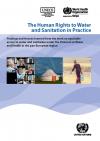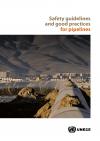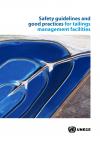Publications
Displaying Results 81 - 100 of 677
- English
Parties, beneficiary countries of the Assistance and Cooperation Programme and other countries wishing to implement the UNECE Convention on the Transboundary Effects of Industrial Accidents sometimes face challenges in the interpretation of its provisions. Shedding light on the basic requirements of the Convention, this Guide offers a practical explanation of what compliance with this legal
- English
These safety guidelines and good practices have been developed to support governments, competent authorities and operators in minimizing the risk of fire and safely retaining firefighting water. They are intended to enhance existing practices and promote harmonized safety standards for firefighting water management and retention, in order to prevent accidental pollution of soil and water,
- English
The Protocol on Water and Health aims at achieving an adequate supply of safe drinking water and sanitation for everyone and effectively protecting water resources in the pan-European region. In pursuing such aims, it gives special consideration to ensure equitable access to water and sanitation services “for all members of the population, especially those who suffer a disadvantage or social
- English
The present publication contains the third Environmental Performance Review of North Macedonia. The report examines the progress made by the country in the management of its environment since it was reviewed for the second time in 2011 and assesses the implementation of the recommendations made in the second review. The third review covers legal and policy frameworks, greening the economy,
- English
The Joint Expert Group was established in 1998 to work on issues related to the prevention of accidental water pollution, in the context of the Convention on the Protection and Use of Transboundary Watercourses and International Lakes (Water Convention) and the Convention on the Transboundary Effects of Industrial Accidents (Industrial Accidents Convention), both serviced by UNECE. These
- English
This postcard provides a brief summary of the UNECE Safety Guidelines and Good Practices for the Management and Retention of Firefighting Water which have been developed by the Joint Expert Group on Water and Industrial Accidents in cooperation with experts on firefighting water retention and UNECE. The Guidelines aim to support governments, competent authorities and operators by enhancing
- English
This postcard provides a brief summary of the UNECE Safety Guidelines and Good Practices for Oil Terminals which have been developed by the Joint Expert Group on Water and Industrial Accidents in cooperation with experts on oil terminals safety and UNECE. The Guidelines provide a set of principles, recommendations and technical recommendations (including for design, planning, procurement,
- English
This postcard provides a brief summary of the UNECE Safety Guidelines and Good Practices for Pipelines which have been developed by the Joint Expert Group on Water and Industrial Accidents in cooperation with experts on pipelines safety and UNECE. The Guidelines contain key principles and recommendations for the safe transport of hazardous substances by pipelines. They include specific
- English
This postcard provides a brief summary of the UNECE Safety Guidelines and Good Practices for Tailings Management Facilities which have been developed by the Joint Expert Group on Water and Industrial Accidents in cooperation with experts on tailings safety and UNECE. The Guidelines provide a set of principles, technical recommendations and good practices that can assist governments and
- Pусский
The Joint Expert Group was established in 1998 to work on issues related to the prevention of accidental water pollution, in the context of the Convention on the Protection and Use of Transboundary Watercourses and International Lakes (Water Convention) and the Convention on the Transboundary Effects of Industrial Accidents (Industrial Accidents Convention), both serviced by UNECE. These
- Français
The Joint Expert Group was established in 1998 to work on issues related to the prevention of accidental water pollution, in the context of the Convention on the Protection and Use of Transboundary Watercourses and International Lakes (Water Convention) and the Convention on the Transboundary Effects of Industrial Accidents (Industrial Accidents Convention), both serviced by UNECE. These
- English
The Joint Expert Group was established in 1998 to work on issues related to the prevention of accidental water pollution, in the context of the Convention on the Protection and Use of Transboundary Watercourses and International Lakes (Water Convention) and the Convention on the Transboundary Effects of Industrial Accidents (Industrial Accidents Convention), both serviced by UNECE. These
- Pусский
This postcard provides a brief summary of the UNECE Safety Guidelines and Good Practices for the Management and Retention of Firefighting Water which have been developed by the Joint Expert Group on Water and Industrial Accidents in cooperation with experts on firefighting water retention and UNECE. The Guidelines aim to support governments, competent authorities and operators by enhancing
- Français
This postcard provides a brief summary of the UNECE Safety Guidelines and Good Practices for the Management and Retention of Firefighting Water which have been developed by the Joint Expert Group on Water and Industrial Accidents in cooperation with experts on firefighting water retention and UNECE. The Guidelines aim to support governments, competent authorities and operators by enhancing
- English
This postcard provides a brief summary of the UNECE Safety Guidelines and Good Practices for the Management and Retention of Firefighting Water which have been developed by the Joint Expert Group on Water and Industrial Accidents in cooperation with experts on firefighting water retention and UNECE. The Guidelines aim to support governments, competent authorities and operators by enhancing
- Pусский
Трансграничные речные и озерные бассейны составляют почти половину земной поверхности и охватывают примерно 60 процентов мирового потока пресной воды. В мире существует также более 600 трансграничных водоносных горизонтов. Сорок процентов населения мира проживает на территории трансграничных бассейнов. Эти
- Français
Transboundary river and lake basins account for nearly half of the earth`s land surface and generate roughly 60 per cent of global freshwater flow. There are also more than 600 shared aquifers. Forty percent of the world`s population lives in shared basins. These shared waters create environmental, social, economic and political interdependencies.Transboundary waters in many areas of the world
- Español
Transboundary river and lake basins account for nearly half of the earth`s land surface and generate roughly 60 per cent of global freshwater flow. There are also more than 600 shared aquifers. Forty percent of the world`s population lives in shared basins. These shared waters create environmental, social, economic and political interdependencies.Transboundary waters in many areas of the world
- English
Transboundary river and lake basins account for nearly half of the earth`s land surface and generate roughly 60 per cent of global freshwater flow. There are also more than 600 shared aquifers. Forty percent of the world`s population lives in shared basins. These shared waters create environmental, social, economic and political interdependencies.Transboundary waters in many areas of the world
- Pусский
The present publication contains the third Environmental Performance Review of Kazakhstan. The report takes stock of progress made by the country in the management of its environment since 2008. It covers legal and policy frameworks, greening the economy, environmental monitoring, and public participation and education for sustainable development. Furthermore, the EPR addresses issues of specific












